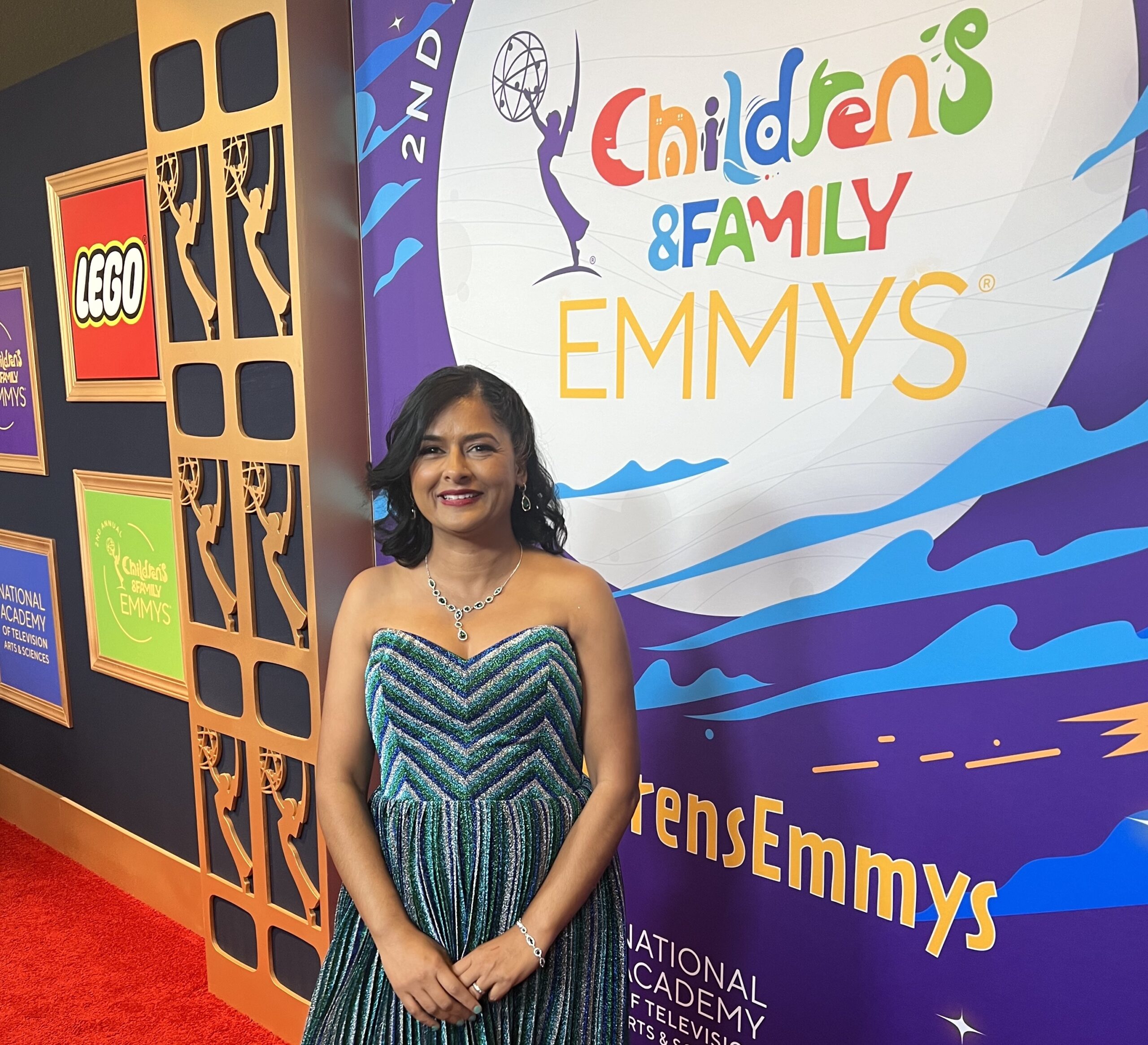
Ahead of the 2nd Annual Children’s & Family Emmy® Awards, we spoke with LMU School of Film and Television Associate Professor Leena Pendharkar, who received a nomination in Directing for a Multiple Camera Program for her work on “Hello Jack! The Kindness Show” (Apple TV+).
An award-winning writer and director, Pendharkar’s other credits include the TV movie “A Date with Deception” (Mar Vista/Lifetime), the feature film “20 Weeks” (HULU), and Vimeo Staff Pick short “Dandekar Makes a Sandwich.”
How do you approach directing projects differently than projects you write?
When I write my own material, I usually write with a specific vision in mind, especially around the look, feel and tone. I can see very clearly how I want to make the film, and so I write it from that perspective. If I am directing something written by another writer, my goal is to elevate the writing to really make the emotions and the visuals of the piece come to life as much as possible. I am definitely very collaborative, and like to talk with the writers and producers about what they are wanting from me as a director coverage wise and performance wise. In my own work, I am also extremely collaborative, but much more so with the actors, the photographer, creative team and producer.
How do you prepare to guest direct?
Very good question. Yes, there is definitely an art and etiquette to guest directing. I was in the Warner Brothers and CBS Diverse Directors programs, and also shadowed some very experienced directors to learn and really understand what is involved. I think the first is respecting the crew, and going around meeting everyone, learning everyone’s names, being cool, kind, and thoughtful with how you interact with everyone. The next is really knowing and understanding the show and the present script. If it’s a long running show, it’s important to watch the last season or the episodes that are already on air. Then from there, it is critical to understand the current script. I read the script a few times, and I have a specific way of breaking it down to understand what is needed in each scene – a scene may be blocking intensive, props intensive or vfx intensive, etc. Then I walk through the locations/sets and make detailed blocking diagrams with shot lists. I use a couple of different programs to do this, but for me, I really need to know my blocking to feel good about the scenes. I do teach some of these techniques in my classes, depending on the level. On set, things may change, but having a plan gives me some footing and clarity.
How do you break into guest directing?
There is no clear path, and it has taken me years to get here, but the best pathway toward anything is to make work that stands out, and really show how well you can work with actors, and make something that’s visually innovative. I really encourage students to make things and apply to festivals, play online and grow from each project that they make. That’s really the best way.
What is it like working on a kids show? Is this a genre you’d like to continue to pursue?
I was actually hired on the show because of my experience working with children. My first independent feature called, “Raspberry Magic,” was told from the perspective of a young girl and had a lot of kids in it, including Bella Thorne, who went on to be on a Disney show. I do enjoy working with kids, though it can also be somewhat challenging at times, especially since the work hours are limited by law. I learned a few hard lessons on my first film, Raspberry Magic. I would like to work on other kids’ shows, especially those that have a more elevated drama feel.
You have an impressive list of accolades on a wide range of interesting projects! Out of all your work, what project are you most proud of?
I would say I am most proud of my second feature, “20 Weeks.” It was about a couple facing some tough choices as their baby is diagnosed with something serious at 20 weeks in utero. I made that movie because I felt creatively that I needed to, and it was based partly on a personal situation in my own life. But we had a shoestring budget and were able to pull off something that I feel proud of. I had a lot of meaningful collaborations, as well.
Do you have any advice for students?
My best advice to students that I constantly hone in on is to constantly create. Write screenplays, make films, web series and whatever else you can and get the work seen in festivals and online. Go to your screenings and meet people and make friends. But with each project you will learn new things and continue to grow. It’s the only way to expand your portfolio and work as a creative, and to push forward in what is otherwise an extremely difficult career.
What is next for you?
I am very actively getting my next indie feature, Days with Dandekar, off the ground with an incredible team of people. It has been a long journey, as I have had the script for over a decade and have tried to get it going in different ways. I think we have some momentum now with some great people attached. I am also playing my short film “Tiny Joy” on the festival circuit now, and writing a couple of feature projects. I also hope to book that next episode of television now that the strikes have eased up.



